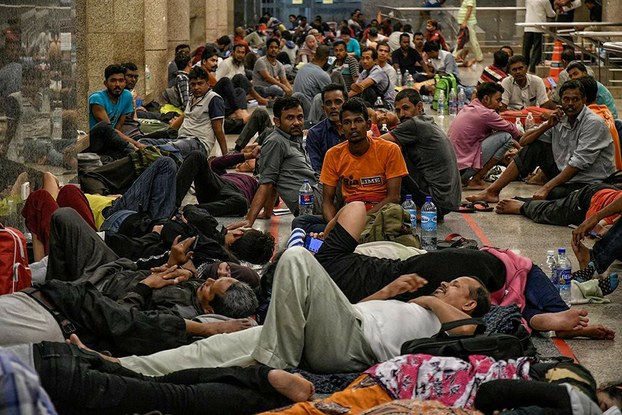An opinion piece by Michelle Yesudas, Legal Adviser, ICJ Asia-Pacific Programme and Rachel Chhoa-Howard, Researcher on Malaysia at Amnesty International.
For decades, Malaysia’s treatment of migrant workers and refugees has wavered between tacit acceptance, neglect, and outright hostility. And the current situation is the lowest point in years.
Refugees and migrant workers have emerged as the government’s favoured excuse for the rise in Covid-19 cases. Most recently, the Prime Minister has attributed the spike in Sabah’s rise in cases to undocumented migrant workers, despite reports of high-profile individuals ignoring quarantine restrictions in droves following state elections.
At a National Security Council meeting at the beginning of this month, the prime minister further stated that to combat the virus, more detention centres that house undocumented migrant workers should be built.
In a recent Information Note on Covid-19, the UN stated that governments have a greater duty to protect people who are in detention. This should be done through “avoiding overcrowding and ensuring hygiene and sanitation in prisons and other detention centres,” among other measures.
Despite this, the practice of arresting, detaining and eventually deporting people alleged to have breached immigration law continues, raising the heightened risk of the disease spreading amongst detainees, as well as spilling over into the general community.
A dangerous shift in government policy
This announcement is just the latest attack on refugee and migrant communities, using the pretext of Covid-19 and weaponised laws to cause untold misery. In recent months, operations by police and immigration officials have seen hundreds of people rounded up and placed in squalid and overcrowded immigration detention facilities, where the risk of contracting Covid-19 is far higher.
Indeed, following raids, immigration detention facilities recorded hundreds of new cases and saw clusters of infections within weeks.
Meanwhile, the coastguard and military pushed away boats of desperate Rohingya people risking their lives to reach the country, or otherwise detained and charged them with immigration offences. Ismail Sabri, Malaysia’s Defence Minister, announced publicly, that Rohingyas have “no status” in the country, despite previous governments being continuously vocal on its support and solidarity with Muslim Rohingyas since 2016.
Home Minister Hamzah Zainudin later added that the government does not recognise the documentation provided by the UN High Commissioner for Refugees (UNHCR) to these refugees, despite prior agreement that bearers of UNHCR cards would be afforded relative protection.
Malaysian authorities are also cracking down on those who publicly voiced concern and exposed the arbitrary, sweeping laws — on immigration and free speech — that make this toxic state of affairs possible.
In July this year, authorities investigated two Al Jazeera journalists from Australia involved in the making of a documentary shedding light on the appalling treatment of migrant workers and refugees amid the Covid-19 lockdown in Malaysia.
The government detained Rayhan Kabir — a Bangladeshi migrant worker featured in the documentary — for weeks. Since then, police have raided Al Jazeera’s offices in Kuala Lumpur and deported Kabir back to his home country. Other critical voices, including the founder of a refugee support organisation, have also faced harassment from the authorities.
The government has used Covid-19 as an opportunity to radically redefine its position on the acceptance of refugees. It’s most recent crackdown highlights the fact that without proper domestic laws protecting the human rights of migrants and refugees, people live in daily fear of exploitation, arbitrary arrest, detention and other human rights abuses.
An inadequate law at the heart of this inhumane policy
The arrest and detention of migrant workers and refugees emphasizes the problematic provisions of Malaysia’s Immigration Act. Under the Act, senior immigration officers have wide powers of search and arrest, which may be used to harass migrants. It also provides for the imprisonment, often indefinitely, of those in breach of local immigration laws in detention centres.
The Immigration Act has been used to sentence migrants to whipping, which is a cruel, inhuman, and degrading punishment prohibited under international human rights law. Furthermore, broadly-worded provisions of the Immigration Act provide the Director General of Immigration with arbitrary powers to revoke and alter the immigration status of non-citizens, such as the two Al Jazeera journalists whose work permits were not renewed.
In addition, Malaysian authorities have used the Immigration Act to arrest, detain and criminally charge a group of Rohingya refugees that arrived by boat and sentence them with the cruel punishment of whipping.
In June this year, the Langkawi Magistrates Court handed down a decision under Section 6 of the Immigration Act, to punish 27 Rohingya men with whipping and seven months in jail for entering Malaysia without valid documentation. Fortunately, following an outcry, the Alor Setar High Court overturned this decision.
However, there are no safeguards to ensure other Rohingya refugees will not face the same threat, in the future.
Time for change
Clearly, Malaysia’s law and policies do not fulfill its international obligations on migrants and refugees. In fact, they are driving them to despair. Caught between the risk of arrest and unemployment, several people are reported to have committed suicide.
It should not take a global health emergency for the Malaysian government to review its policies on the criminalisation of those who fall foul of the Immigration Act, however there is no better time for the government to do so.
Instead of criminalising people, the government should coordinate across ministries and agencies and work with civil society organisations to amend legislation as well as informal guidelines and policies that fall far below international standards.
Malaysia must also ratify international conventions relating to refugees and migrant workers. And instead of silencing critical voices, authorities should address their well-founded concerns. Only when these measures are in place, will migrants and refugees in Malaysia have the proper protection they deserve.
First published in Malay Mail on 9 October: https://www.malaymail.com/news/what-you-think/2020/10/09/unfettered-powers-fatal-gaps-malaysias-inhumane-crackdown-on-migrants-refug/1911091

